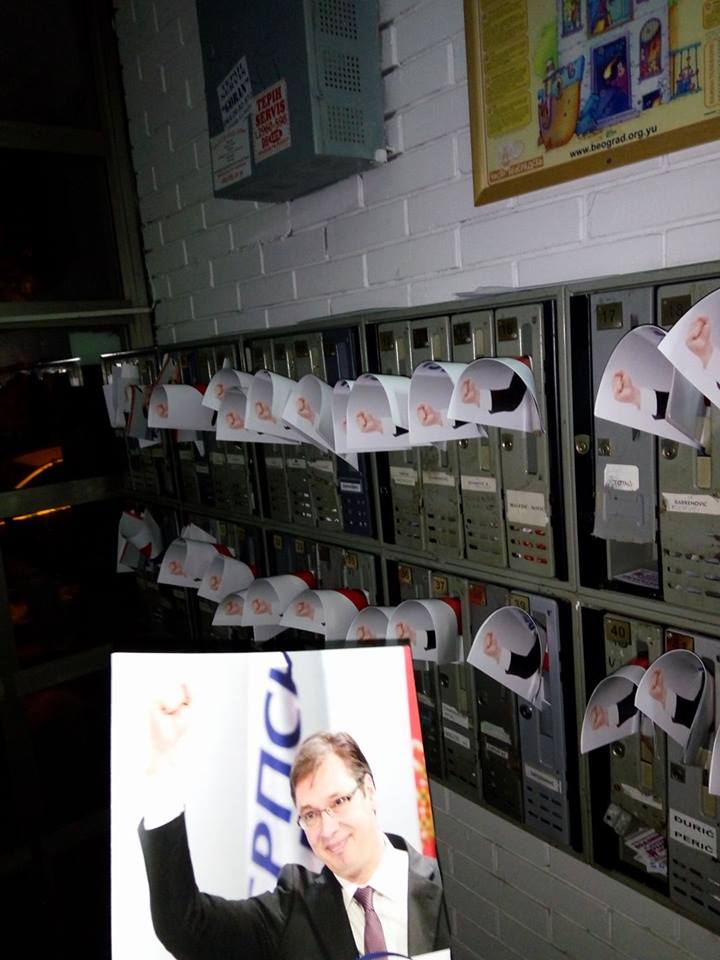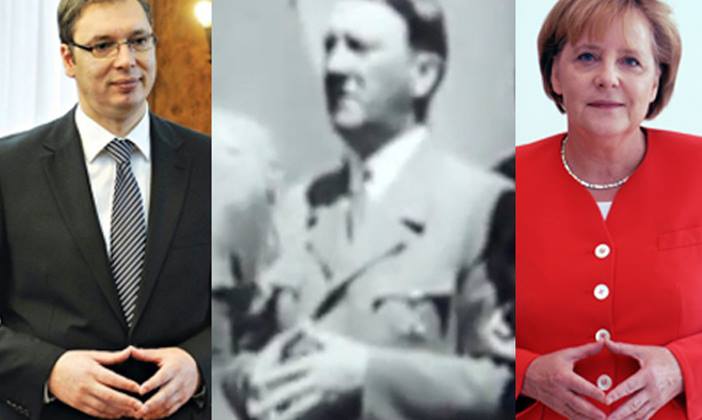
Views: 2565
Author’s note: a draft version of the article was originally written at the end of December 2015 and published in March 2016. This is the extended article’s version.
On April 24th, 2016 Serbia faced three-level elections: for the national parliament, local municipalities and Vojvodina’s autonomous provincial administration. The elections did not cover Kosovo province as current Serbia’s pro-NATO/EU’s government already two years ago de facto recognized in its negotiations with the EU and Pristina’s government that this province is not any more an integral part of the legal and administrative system of the Republic of Serbia. Nevertheless, these elections were in the real sense of the meaning the historical once as it had to be finally clarified which “empire” Serbia is going to join in the coming future: the NATO/EU’s one or the Russian.
Kosovo
Serbia’s PM Aleksandar Vučić (originally from municipality of Bosnian town of Bugojno) had informed the nation on December 17th, 2016 after the session of the General Board of his ruling (and dictatorial western-backed) Serbian Progressive Party (SPP) that Serbia will face in the spring 2016 all three-level elections at the same time: the extraordinary parliamentary, the local and Vojvodina’s provincial. The purpose of the extraordinary parliamentary elections, according to the PM, was to obtain a full mandate for his SPP until 2020 in order to finish all designed “progressive” reforms in the country which is on the “stable and safe road”. However, the fundamental question was and is: what is the stable and safe road of the present-day Serbia?
 One can ask why A. Vučić opted for the extraordinary parliamentary elections if it is known that his party has controlling the parliament with an absolute majority in coalition with (Slobodan Milošević’s established) the Serbian Socialist Party (SSP) and there are no any serious tensions in the society or any significant opposition to his in fact personal and party’s authoritarian regime which is overwhelmingly supported by the west?
One can ask why A. Vučić opted for the extraordinary parliamentary elections if it is known that his party has controlling the parliament with an absolute majority in coalition with (Slobodan Milošević’s established) the Serbian Socialist Party (SSP) and there are no any serious tensions in the society or any significant opposition to his in fact personal and party’s authoritarian regime which is overwhelmingly supported by the west?
The answer can be only one and simple: it is de facto decision by the main sponsor and even establisher of the SPP – the US embassy in Belgrade. A decade ago, the party was suddenly established by two top ex-radicals: Aleksandar Vučić – a Secretary General and Tomislav Nikolić – a vice-president of the Serbian Radical Party (SRP) which was in the 1990s in governmental and parliamentary coalition with Slobodan Milošević’s SSP. From that time up to now the party’s main political course is the pro-western one, with the cardinal aim for Serbia (without Kosovo) to become a full Member State of the European Union (the EU) and of course of the NATO. The NATO’s membership is, however, not openly advocated for the only reason not to alienate the ethnic Serbs from Serbia (as a majority of population) from the western course of the party and now the government. Nevertheless, it is quite clear that these two memberships have to go together and even that Serbia, like the FYR of Macedonia or Montenegro, firstly has to join the NATO as the open doors for the EU’s membership. The practical problem for both the US and the EU administrations is that overwhelming majority of the ethnic Serbs from Serbia oppose Serbia’s membership to the NATO. According to many investigations of the public opinion during the last decade, it is clear that absolute majority of Serbia’s citizens do not want to see their country as a NATO’s member and even more, they will not support the EU’s membership if the NATO’s membership is a necessary condition. It is also clear that recognition of Kosovo’s independence has to be a crucial political condition for Serbia’s EU’s membership that is originally scheduled by Brussels to happen in 2020 or very soon after this year.
As the western client state of Serbia already started on December 14th, 2015 the final phase of the negotiations with the EU, the very practical problem for the western bosses of quasi Serbia’s independence is how to avoid national dissatisfaction and even possible revolution when Serbia will finally and de jure recognize Kosovo’s independence as a technical precondition for a full membership to the EU? Obviously, Washington decided to make as stronger as position of the SPP in the parliament after the new elections hoping that the party will form the government without making any parliamentary coalition. The hope was a real and realistic having in mind at least three fundamental facts:
-
All Serbia’s mass media (excluding only part of the internet that is not making any serious influence to the electorate) is under a full Vučić’s (i.e., the US) control.
-
The citizens of Serbia, including primarily the ethnic Serbs, are during the last 15 years of “democratic” regimes quite well bombed by the pro-western governmental and the NGO sector’s controlled media that the Uncle Sam could believe that their minds are already well prepared (washed) for the final decision to join the western (anti-Russian) train.
-
The Russian factor in Serbia, due to such media situation and governmental-NGO’s anti-Russian propaganda, is already not serious obstacle for the realization of the crucial western political plans with this Balkan country (likewise with the FYR of Macedonia and Montenegro).
Russia
Obviously, Russia was and is the only great global power which historically was and still is protecting the national interests of Serbia and the Serbs and for that reason for Washington, Berlin and Brussels is clear that the Russian influence in the region, but above all among the Orthodox Serbs, has to be as much as minimized in order to totally transform Serbia and the Republic of Srpska (still part of Bosnia-Herzegovina) into their classical 19th century oversea political, economic and financial colonies as it was already done with all ex-Socialist Central European nations who joined both the EU and the NATO. The western long-term designs with the Serbs are, as well as, clear: to dismiss the Republic of Srpska in Bosnia-Herzegovina and to separate territories of Vojvodina and Raška (Sandžak in Turkish) from the rest of Serbia. In this case, Serbia will have state borders as it was already at the time between the Berlin Congress (1878) and the Balkan Wars (1912−1913). Nonetheless, with such post-2000 October Revolution Serbia’s governments and the Russian not proper political activity in the region such scenario is quite possible.
 The Uncle Sam was realistically expecting that coming Serbia’s extraordinary parliamentary elections are going to be won (with absolute majority) by its client Vučić’s SPP due to expected absence of approximately half of Serbia’s electorate and already enough pro-western and anti-Russian washed brains of the majority of those who will vote. In this case the SPP will form extremely stable government in the parliament with an absolute majority of the seats. In fact, finally, it happened: Vučić’s SPP won 48,23% of the votes (electoral activity was 55%) and in a coalition with its traditional parliamentary collaborator Milošević’s SSP (10,98% of the votes) or even alone can continue with its authoritarian governmental practice for the next four years that is quite enough to irretrievably hook up Serbia’s wagon to the NATO/EU’s train composition.
The Uncle Sam was realistically expecting that coming Serbia’s extraordinary parliamentary elections are going to be won (with absolute majority) by its client Vučić’s SPP due to expected absence of approximately half of Serbia’s electorate and already enough pro-western and anti-Russian washed brains of the majority of those who will vote. In this case the SPP will form extremely stable government in the parliament with an absolute majority of the seats. In fact, finally, it happened: Vučić’s SPP won 48,23% of the votes (electoral activity was 55%) and in a coalition with its traditional parliamentary collaborator Milošević’s SSP (10,98% of the votes) or even alone can continue with its authoritarian governmental practice for the next four years that is quite enough to irretrievably hook up Serbia’s wagon to the NATO/EU’s train composition.
The consequences are going to be drastic and even catastrophic for Serbia’s territorial integrity and national interest of the ethnic Serbs but for Russia as well, as the Russian influence in the region is going to be totally eliminated.
Finally, a great part of guiltiness for such situation is on the Russian side itself as Russia simply left the Serbs on the western mercy in 2003 when the Russian peace-keeping troops left both Bosnia-Herzegovina and Kosovo. It is not also understandable why Russia is not financing and politically supporting any serious pro-Russian political party or NGO in Serbia, or at least why such party and/or NGO (if exists) is not profoundly supported by Moscow as it is openly done by Washington, Brussels and Berlin with their own client political parties and NGO’s sector. Vučić’s SPP is currently the most successful western financed and sponsored story in Serbia and Moscow very well know that party’s official policy of “and Europe and Russia” is only a great bluff for the people’s masses especially at the time of electoral campaigns. The SPP’s “stable and safe road” is a road to the NATO and the EU.
Question
But why Russia left Serbia to go on this road? The only reasonable and logical explanation seems to be that according to some secret deal between Washington and Moscow achieved even before Kosovo’s independence proclamation in February 2008, the Balkans is left to the western areal dominance at the exchange for the Transcaucasus and the part of East Europe (the East and South Ukraine, Belarus and Moldova) which are included into Russia’s sphere of influence.
 Prof. Dr Vladislav B. Sotirovic
Prof. Dr Vladislav B. Sotirovic
www.global-politics.eu/sotirovic
sotirovic@global-politics.eu
© Vladislav B. Sotirovic 2016
Origins of images: Facebook, Twitter, Wikimedia, Wikipedia, Flickr, Google, Imageinjection, Public Domain & Pinterest.
Read our Disclaimer/Legal Statement!
Donate to Support Us
We would like to ask you to consider a small donation to help our team keep working. We accept no advertising and rely only on you, our readers, to keep us digging the truth on history, global politics and international relations.
[wpedon id=”4696″ align=”left”]
FOLLOW US ON OUR SOCIAL PLATFORMS









